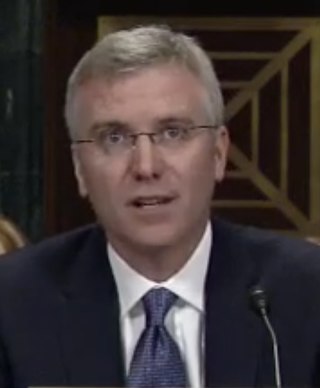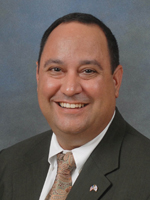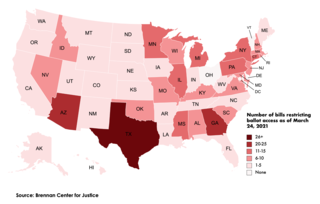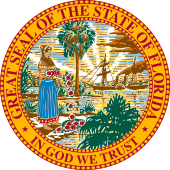State Registered Domestic Partnerships (SRDP) in Washington were created in 2007 following the Andersen v. King County decision. Subsequent legislation has made an SRDP the equivalent of marriage under state law. As a result of the legalization of same-sex marriage in the state, from June 30, 2014, SRDP will be available only when at least one of the partners is sixty-two years of age or older.

Elections in Florida are held on the first Tuesday after the first Monday of November in even-numbered years, as provided for in Article 6 of the Florida Constitution. For state elections, the Governor of Florida, Lieutenant Governor, and the members of the Florida Cabinet, and members of the Florida Senate are elected every four years; members of the Florida House of Representatives are elected every two years. In national elections, Florida plays an important role as the largest bellwether state, occasionally determining the outcome of elections for U.S. President — as it did in 1876 and in 2000.

The 2009 Washington Referendum 71 (R-71) legalized domestic partnership in Washington state, the first statewide referendum in the United States that extended to LGBT people the rights and responsibility of domestic partnership. The bill had passed State Legislature, and it was signed into law by the Governor in May 2009, but opponents gathered enough signatures to put the measure before the voters, who returned ballots by mail over three weeks ending on November 3, 2009, approving the measure 53% to 47%. The new law went into effect 30 days later, on December 3, 2009.

Frank LaRose is an American politician. He was elected Secretary of State of Ohio in 2019. He was a Republican member of the Ohio State Senate for two terms, from January 2011 to January 2019. He is a candidate for the U.S. Senate in the 2024 election, challenging incumbent Senator Sherrod Brown.

The Ohio Collective Bargaining Limit Repeal appeared on the November 8, 2011 general election ballot in the state of Ohio as a veto referendum. Senate Bill 5 (SB5) was repealed by Ohio voters after a campaign by firefighters, police officers and teachers against the measure, which would have limited collective bargaining for public employees in the state. The formal title of the proposal that this measure nullified is Senate Bill 5. Among other provisions, SB 5 would have prevented unions from charging fair share dues to employees who opt out. The process to place the referendum on the ballot for voters to decide was completed by supporters, as signatures were certified by the Ohio Secretary of State. The group behind the referendum effort was the political action committee We Are Ohio.

Mark Eaton Walker is the chief United States district judge of the United States District Court for the Northern District of Florida.

Ronald Dion DeSantis is an American politician serving since 2019 as the 46th governor of Florida. A member of the Republican Party, he represented Florida's 6th congressional district in the U.S. House of Representatives from 2013 to 2018. DeSantis is a candidate in the 2024 United States presidential election.

Raymond Wesley Rodrigues is the 12th chancellor of the State University System of Florida since 2023. Previously, he served four terms in the Florida House of Representatives, representing southern and coastal Lee County from 2012 to 2020 and one term in the Florida Senate from 2020 to 2022. His campaign website describes him as conservative.

Manny Díaz Jr. is an American politician who is currently serving as the 28th Education Commissioner of Florida. Díaz was a member of the Florida Senate from 2018 to 2022, representing the 36th district, which encompasses the Hialeah area in northwest Miami-Dade County. He also served three terms in the Florida House of Representatives from 2012 to 2018, which encompassed parts of Hialeah and Northwest Miami-Dade County, Florida.

The Florida Medical Marijuana Legalization Initiative, also known as Amendment 2, was approved by voters in the Tuesday, November 8, 2016, general election in the State of Florida. The bill required a super-majority vote to pass, with at least 60% of voters voting for support of a state constitutional amendment. Florida already had a medical marijuana law in place, but only for those who are terminally ill and with less than a year left to live. The goal of Amendment 2 is to alleviate those suffering from these medical conditions: cancer, epilepsy, glaucoma, positive status for human immunodeficiency virus (HIV), acquired immune deficiency syndrome (AIDS), post-traumatic stress disorder (PTSD), amyotrophic lateral sclerosis (ALS), Crohn's disease, Parkinson's disease, multiple sclerosis, chronic nonmalignant pain caused by a qualifying medical condition or that originates from a qualified medical condition or other debilitating medical conditions comparable to those listed. Under Amendment 2, the medical marijuana will be given to the patient if the physician believes that the medical use of marijuana would likely outweigh the potential health risks for a patient. Smoking the medication was not allowed under a statute passed by the Florida State Legislature, however this ban was struck down by Leon County Circuit Court Judge Karen Gievers on May 25, 2018.

Joe Gruters was the Chairman of the Florida Republican Party from 2018 to 2022, and is a member of the Florida Senate representing the 22nd District, which consists of Sarasota County and part of Charlotte County. He was previously a member of the Florida House of Representatives. Earlier in his career, Gruters worked on the campaign of U.S. Rep. Vern Buchanan as campaign manager and was vice chairman of the Republican Party of Florida and chairman of the Republican Party of Sarasota.

Florida Amendment 4, also the Voting Rights Restoration for Felons Initiative, is an amendment to the Constitution of Florida passed by ballot initiative on November 6, 2018, as part of the 2018 Florida elections. The proposition restored the voting rights of Floridians with felony convictions after they complete all terms of their sentence including parole or probation. The amendment does not apply to Floridians convicted of murder or sexual offenses.

Brenda Calhoun Snipes was an American public official who was the Supervisor of Elections for Broward County, Florida. She was appointed by Governor Jeb Bush in 2003. Snipes was registered as a Democrat.

The movement to decriminalize psilocybin in the United States began in 2019 with Denver, Colorado, becoming the first city to decriminalize psilocybin in May of that year. The cities of Oakland and Santa Cruz, California, decriminalized psilocybin in June 2019 and January 2020, respectively. Washington, D.C., followed suit in November 2020, as did Somerville, Massachusetts, in January 2021, and then the neighboring Cambridge and Northampton in February 2021 and March 2021, respectively. Seattle, Washington, became the largest U.S. city on the growing list in October 2021. Detroit, Michigan, followed in November 2021.

Postal voting in the United States, also referred to as mail-in voting or vote by mail, is a form of absentee ballot in the United States, in which a ballot is mailed to the home of a registered voter, who fills it out and returns it by postal mail or drops it off in-person at a secure drop box or voting center. Postal voting reduces staff requirements at polling centers during an election. All-mail elections can save money, while a mix of voting options can cost more. In some states, ballots may be sent by the Postal Service without prepayment of postage.

A general election was held in the U.S. state of Pennsylvania on November 3, 2020. The office of the Pennsylvania Secretary of the Commonwealth oversees the election process, including voting and vote counting.

Following the 2020 United States presidential election and the unsuccessful attempts by Donald Trump and various other Republican officials to overturn it, Republican lawmakers initiated a sweeping effort to make voting laws more restrictive within several states across the country. According to the Brennan Center for Justice, as of October 4, 2021, more than 425 bills that would restrict voting access have been introduced in 49 states—with 33 of these bills enacted across 19 states so far. The bills are largely centered around limiting mail-in voting, strengthening voter ID laws, shortening early voting, eliminating automatic and same-day voter registration, curbing the use of ballot drop boxes, and allowing for increased purging of voter rolls. Republicans in at least eight states have also introduced bills that would give lawmakers greater power over election administration after they were unsuccessful in their attempts to overturn election results in swing states won by Democratic candidate Joe Biden in the 2020 election. The efforts garnered press attention and public outrage from Democrats, and by 2023 Republicans had adopted a more "under the radar" approach to achieve their goals.
The Election Integrity Act of 2021, originally known as the Georgia Senate Bill 202, is a law in the U.S. state of Georgia overhauling elections in the state. It replaced signature matching requirements on absentee ballots with voter identification requirements, limits the use of ballot drop boxes, expands in-person early voting, bars officials from sending out unsolicited absentee ballot request forms, reduces the amount of time people have to request an absentee ballot, increases voting stations or staff and equipment where there have been long lines, makes it a crime for outside groups to give free food or water to voters waiting in line in order to solicit votes, gives the Georgia General Assembly greater control over election administration, and shortens runoff elections, among other provisions.

The 2021 Maricopa County presidential ballot audit, commonly referred to as the Arizona audit, was an examination of ballots cast in Maricopa County during the 2020 United States presidential election in Arizona initiated by Republicans in the Arizona State Senate and executed by private firms. Begun in April 2021, the audit stirred controversy due to extensive previous efforts by Trump and his allies to overturn the election and due to assertions of rule violations and irregularities in the conduct of the recount, leading to claims that the audit was essentially a disinformation campaign. In June 2021, Maggie Haberman of The New York Times and Charles Cooke of National Review reported Trump had told associates that based on the results of the audit, he would be reinstated as president in August 2021. By early August, no evidence of widespread fraud had surfaced.

Florida Senate Bill 254 is a law that prohibits gender-affirming care for anyone under the age of 18, places restrictions on adult patients accessing this care, and allows the state to take temporary custody of children who may be receiving gender-affirming care now or in the future.

















